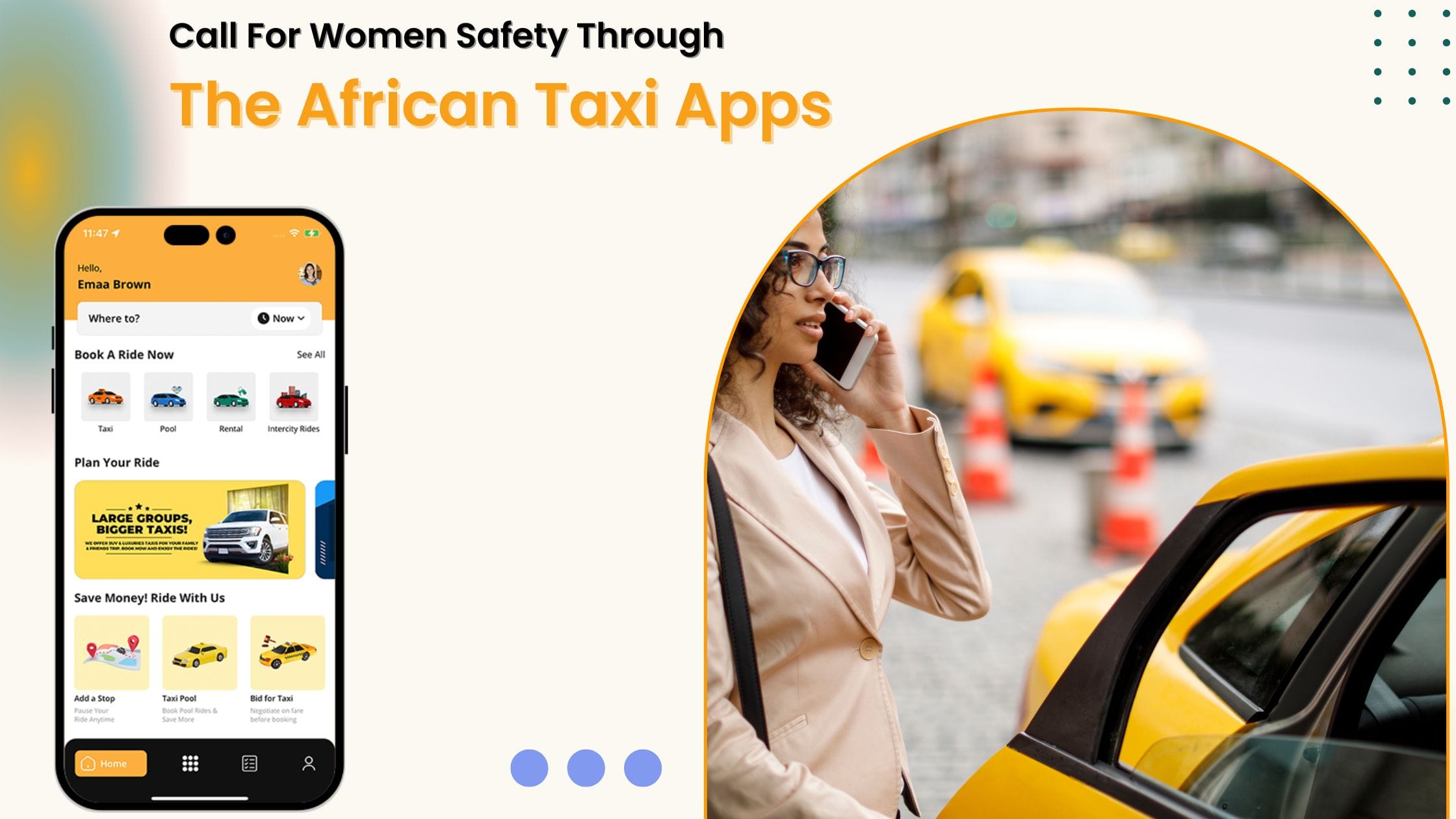Ride-hailing apps are booming in Africa and are popular with women. Tech isn’t the main way to solve problems in Congo and Cameroon but this story is exciting. In this blog, you will learn about some of the taxi apps working today for women’s empowerment in Congo and Cameroon, along with their features.

Introduction
Since the advent of taxi apps, a large number of consumers, for the sake of convenience, have demanded these services for their daily commutes. In Africa, where public transportation can be inconsistent and sometimes unsafe, ride-hailing apps have become a go-to solution for many. However, as these services gain popularity, a critical issue has come to the forefront: women’s safety. African women are not just raising their voices; they’re also taking action.
Changing Culture in Congo and Cameroon
In Cameroon, over one-third of women have faced some type of violence in their lives, according to the United Nations. Ride-hailing apps are very helpful for women in Cameroon. They make it easier for them to get to work, the market, and to travel with their children.
Only about 37% of people in Cameroon use the internet. There is also a big gap between men and women, with fewer women having internet access. But ride-hailing apps in Cameroon only work in cities, which makes it harder for women in rural areas.
In Cameroon, like in other places, local transport workers have complained that ride-hailing apps are unfair competition. Tech start-ups are offering smart ways to improve road safety in Cameroon, but it will take work.
African Taxi Apps and Their Influence
In South Africa, Uber, a leading ride-hailing company in the region, now let’s female drivers choose to have only female passengers. Similarly, there are other taxi apps that are leading the way for women led drivers.
Ubiz Cabs
Ubiz Cabs is the first on-demand car service in Kinshasa, and they’re easy to spot. Their bright pink cabs zip up and down the busy streets of Kinshasa, the largest city in central Africa and the capital of the Democratic Republic of Congo.
Started in 2019, Ubiz Cabs is a great project to empower women and create jobs for them in Congo. Ubiz Cabs gives women steady work in an industry mostly run by men while also keeping them safe.
Unlike other taxi apps, Ubiz Cabs only hires female drivers to help them earn a living in Kinshasa. This is a perfect social business with great branding.
Today, Ubiz Cabs drivers earn more money, which helps many Congolese women financially. The tech world has seen many cool inventions. Still, Ubiz Cabs has turned its story into a more caring and impactful journey by empowering women.
Yango and Gozem
In the Cameroonian city of Douala, Yango had issues with high prices, fake drivers, and harassment in taxis. Now, Yango is trying hard to hire more female drivers. Furthermore, Gozem, a ride-hailing app that also offers food and grocery delivery across West Africa, women use the service the most.
Women Safety Features of Top African Taxi Apps
The ride-hailing business is growing fast in Africa, led by companies like Uber, Yango, Heetch, and Gozem. They offer safety features like panic buttons and GPS, train their drivers, and try to hire more women. Besides SOS buttons and trackers, women drivers can cancel a trip if they expect a female passenger but a man shows up.
With these apps, driver info helps track bad drivers, and customer ratings keep drivers on their best behavior. The app’s safety feature lets users share their trip details with contacts and quickly report drivers who break traffic rules or misbehave.
The cars have panic buttons and GPS devices so a security company can find any driver in an emergency. Women drivers stop work in the evening, and men take over—this keeps employees safer. Still, it means no female driver is available late at night.
While big ride-hailing companies promise tougher action, some women are starting another solution to keep female riders safe: ride-hailing by women, for women. Women in Africa are rising, and these are great stories we should celebrate. Tech entrepreneurs and women worldwide are very happy about this. Women-only service is growing, with many more women wanting to become drivers.
Start Your Own Taxi App Business in Africa
While big ride-hailing companies promise tougher action, some women are starting another solution to keep female riders safe: ride-hailing by women, for women. Women in Africa are rising, and these are great stories we should celebrate. Tech entrepreneurs and women worldwide are very happy about this. Women-only service is growing, with many more women wanting to become drivers.
Traditional taxi unions, often male-dominated, have resisted these newcomers. There have been reports of intimidation. Also, in some regions, cultural norms discourage women from driving professionally. Yet, the momentum is undeniable.
As these services grow, they’re not just changing how women move through cities—they’re changing how cities move for women. In an Africa rapidly urbanizing, where safety concerns often limit women’s participation in public life, these taxi apps are vehicles for social change. They show that when women take the wheel, everyone moves forward.
Your Roadmap to Taxi App Business in Africa
Why Africa? The continent is a hotbed for mobile innovation. With over 650 million mobile users, many leapfrogging straight to smartphones, Africa’s digital economy is booming. Moreover, rapid urbanization is creating transport gaps. Women-focused services could capture a significant slice. Here’s your roadmap:
Choose wisely. Pick cities with tech-savvy populations. Navigate regulations. In many African countries, ride-hailing apps must register as transport network companies Challenges? Yes. In some areas, cultural norms might resist women driving. Infrastructure issues like poor roads can hinder operations. Competition from established players will be fierce.
But the opportunity is immense. Africa’s cities are transforming, and women are demanding safer, more empowering transport. By starting a women-focused taxi app, you’re not just entering a market—you’re shaping its future. You’re offering more than rides; you’re offering freedom, safety, and economic power. In Africa’s urban revolution, women are taking the wheel. Will your app be their chosen vehicle?
Why White-Label in Africa?
In fast-evolving cities, being first matters. White-label apps let you launch in weeks, not months. Top firms offer multilingual support—critical in Africa’s diverse linguistic landscape. You handle branding, recruitment, and safety. They handle tech.
The white-label approach lets you focus on what matters most in Africa’s women-centric taxi market: building trust, ensuring safety, and empowering women economically. Tech is just the vehicle; your local know-how and commitment to women’s needs are the real drivers.
In a continent where a taxi app can mean the difference between vulnerability and empowerment, white-label firms offer more than software—they offer a faster path to making African cities safer for women. Your brand, their tech, Africa’s future. It’s a powerful combination.
Conclusion
In the burgeoning African ride-hailing market, particularly in the women-focused segment, you don’t need to build everything from scratch. Enter white-label taxi app solutions—pre-built, customizable platforms that let you launch quickly and professionally. This trend is not just a safety measure—it’s a movement towards empowerment.








